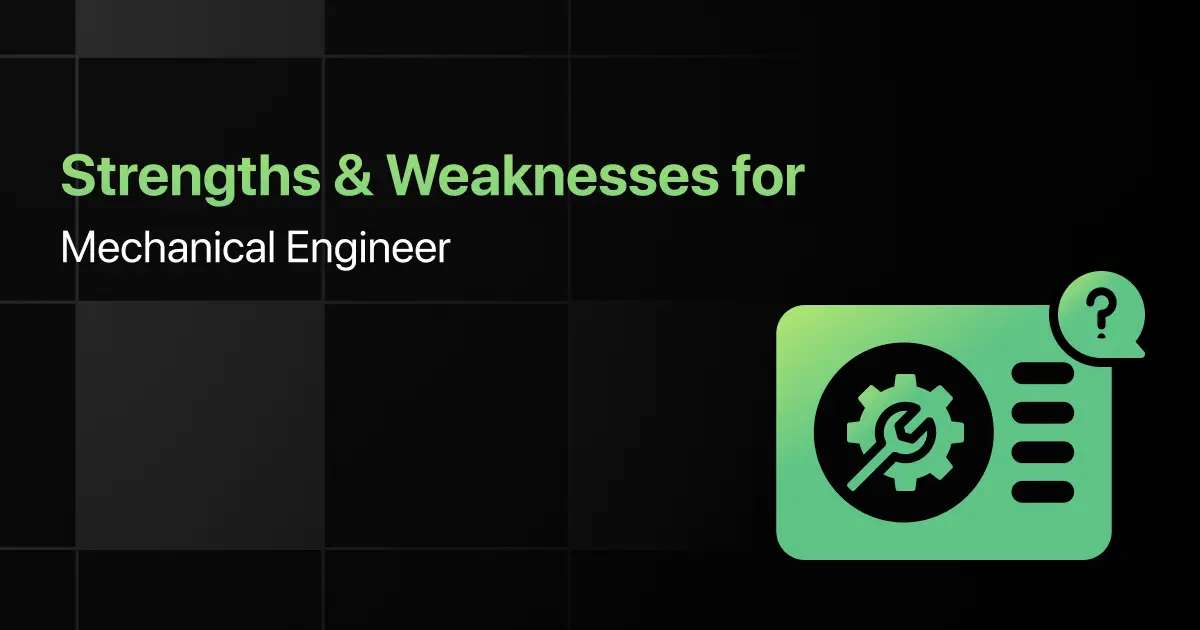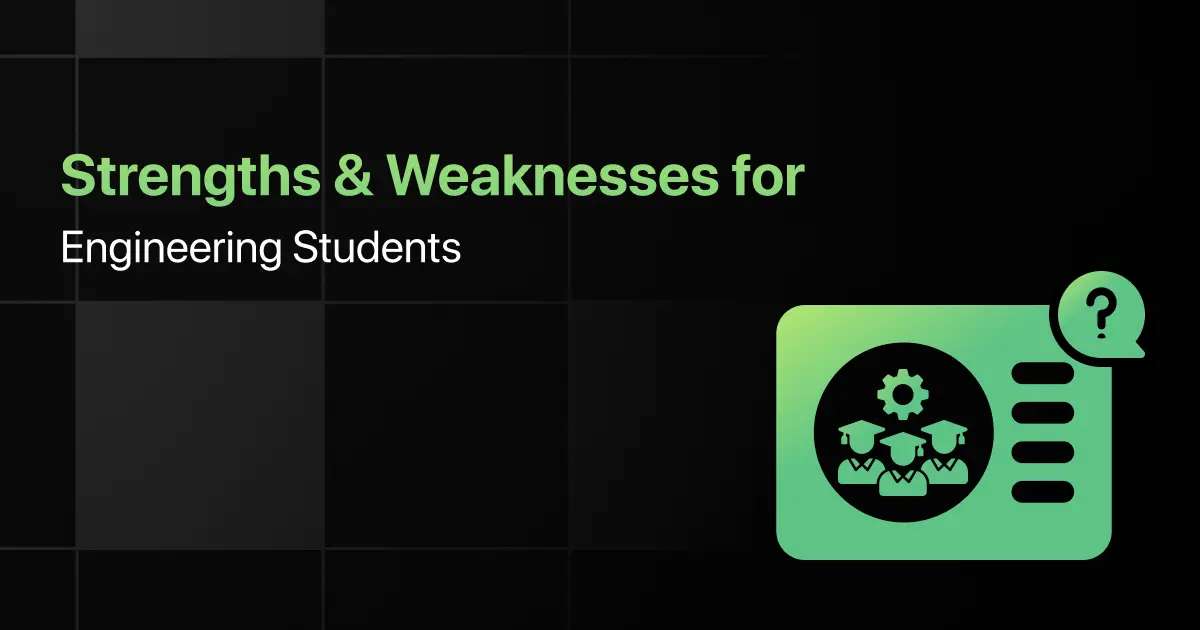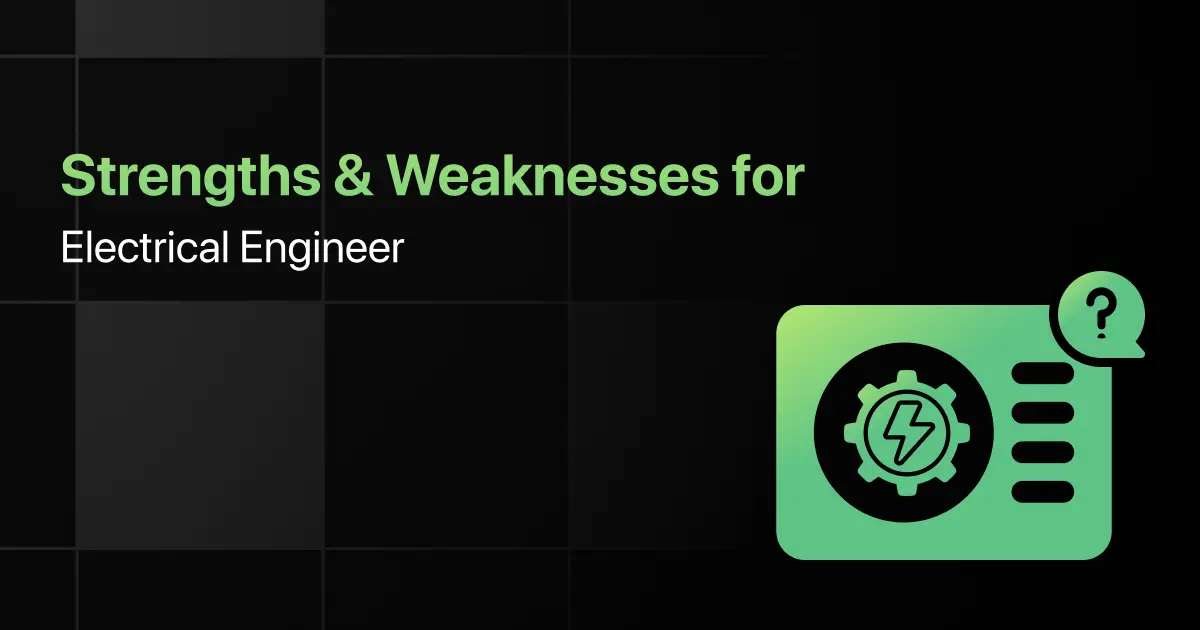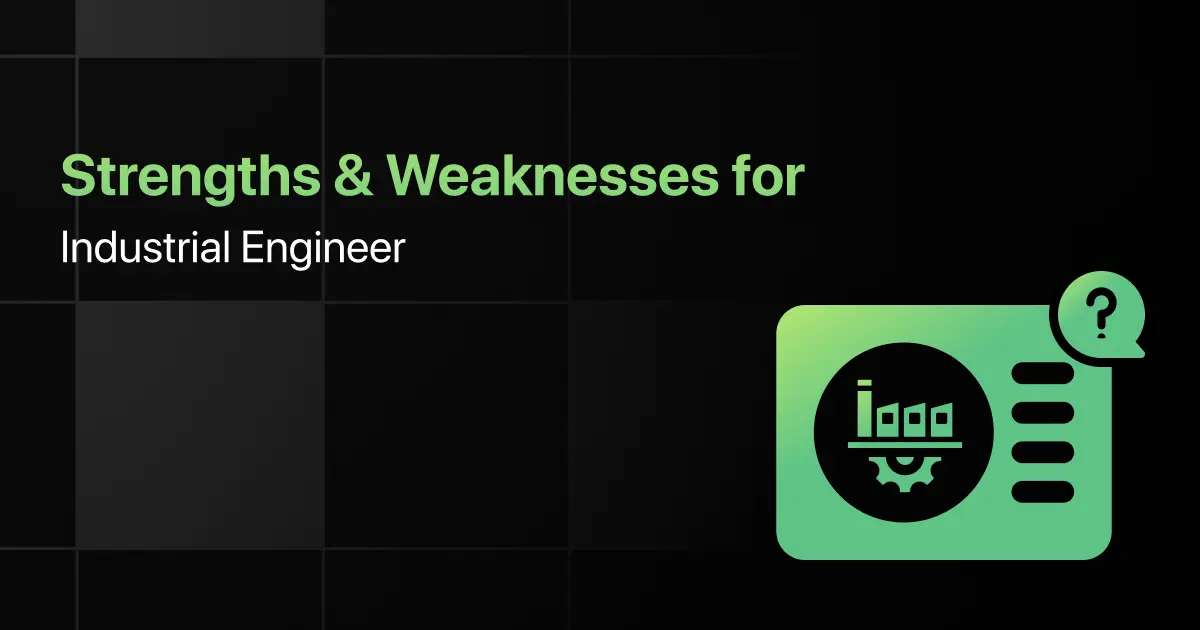Strengths & Weaknesses for Mechanical Engineer Freshers

When mechanical engineers go for job interviews, they need to show they’re good at both technical skills and working with others.
However, it’s tough to talk about what you’re good at and what you need to work on.
This blog will help with strengths & weaknesses for mechanical engineers.
Strengths for Mechanical Engineer Interviews
Below are the 3 strengths for mechanical engineers for interviews:
1. Advanced Proficiency in CAD Software
Computer-aided design (CAD) software is essential for mechanical engineers. It helps them make detailed drawings and models of machines and parts.
This skill is especially important because it allows engineers to see and fix problems in their designs before making any real parts, saving both time and money.
Template Version:
“In my role at [Your Previous Company or Project], I used my advanced CAD skills, especially with [specific CAD software], to improve our design processes.
This led to a [specific result, e.g., ‘30% reduction in the time it took to develop prototypes’].”
Logic Behind This:
This example is good because it shows real achievements and numbers, making your skills clear and relatable.
It tells interviewers exactly how you can help their projects, which is what they want to know.
Mistakes to Avoid:
Don’t just say “I’m good at CAD.” Give specific details about what you can do.
Name the CAD programs you know. Different jobs might need different ones.
Always connect your skills to how they helped make your work better or faster.
2. System Integration Skills
System integration skills involve the ability to bring together different subsystems to function as a whole.
This is a vital strength for mechanical engineers as it ensures that all parts of a project work well together, from software and hardware to other mechanical components.
Engineers with these skills can oversee and manage the interaction between different systems, which is critical in complex projects like manufacturing processes or robotics.
Template Version:
“At [Your Previous Company or Project], I utilized my system integration skills to ensure that all components of our [specific project or machine, e.g., ‘automated assembly line’] worked together flawlessly.
I coordinated with different teams to align our subsystems, which led to [specific result, e.g., ‘a 25% increase in operational efficiency’].”
Logic Behind This:
This template works well because it shows not just that you have the skills, but also how you use them to make things better in real situations, which is exactly what employers need to hear.
Mistakes to Avoid:
Don’t just say you have integration skills. Explain how you’ve used them in particular situations.
Integration often involves different teams. Show that you can work well with others.
Always connect your skills to improvements in the project or product.
3. Project Management
Project management is key for mechanical engineers. It’s about planning, organizing, and overseeing tasks to make sure projects are done well, on time, and within budget.
Being good at this helps the whole team work better together and makes sure resources are used the right way.
Template Version:
“At [Your Previous Company], I used my project management skills to make sure we finished our projects on time and didn’t go over budget.
My job was to plan everything carefully, make sure everyone knew what to do, and check that everything was going smoothly.
This helped us cut down the time it took to finish projects by [specific result, like ‘20%’], making sure we did great work fast. This fits perfectly with what your team needs.”
Logic Behind This:
This template shows exactly how project management skills make a big difference in getting projects done better and faster.
Mistakes to Avoid:
Don’t just say “I manage projects.” Explain how you manage them and the good results that come from it.
Avoid vague terms like “I’m good at project tasks.” Be clear about the actions you take in project management.
Make sure to mention specific outcomes from your project management, like time or cost savings.
Weaknesses for Mechanical Engineer Interviews
Below are the 3 weaknesses for mechanical engineers for interviews:
1. Limited Experience with New Technologies
Limited experience with new technologies means not knowing the latest tools and methods in mechanical engineering.
It’s important for mechanical engineers to keep up-to-date because the field changes fast, and new technologies can make work better and easier.
Template Version:
“At my last job, I mostly worked with older engineering methods and didn’t get much chance to use the newest technologies like [insert specific technology, e.g., ‘3D printing’ or ‘AI-based simulation tools’].
I am now taking time to learn these new tools to make sure I can keep up with the latest in my field.”
Logic Behind This:
This template is good because it’s straightforward and shows that you’re willing to learn and improve. It tells your interviewer exactly what you’re doing to get better at your job.
Mistakes to Avoid:
Don’t talk about technologies that aren’t related to your job.
Don’t make excuses for not knowing the new technologies.
Always mention how you’re working to learn more and improve your skills.
2. Difficulty in Handling Non-Technical Stakeholders
Difficulty in handling non-technical stakeholders means struggling to explain complex engineering concepts in simple terms that people who aren’t engineers can understand.
This is important because mechanical engineers often need to work with people from different parts of a company, like sales or marketing, who need to understand the technical aspects to do their jobs well.
Template Version:
“In previous projects, I noticed I sometimes had trouble explaining technical details to non-engineers in a way that was easy for them to understand.
I am actively working on this by taking courses on communication and practicing by explaining my projects to friends and family who aren’t in engineering.”
Logic Behind This:
This template helps because it makes it clear that you’re committed to being better at communicating with everyone at work.
Mistakes to Avoid:
Avoid using too much technical jargon when explaining this weakness.
Don’t ignore the importance of this skill by focusing only on technical skills.
Be careful not to sound like you’re not interested in improving this area. Always show your effort and commitment to growth.
3. Overemphasis on Perfection
Overemphasis on perfection means spending too much time making sure every detail is flawless. This can be a problem because it might slow down projects and make it hard to meet deadlines.
Mechanical engineers need to balance being detailed with being efficient to keep projects moving smoothly.
Template Version:
“In my past roles, I’ve realized that my focus on making everything perfect can sometimes delay the project timelines.
I’ve been working on this by setting more realistic standards and prioritizing tasks that are critical to the project’s success.
This approach helps me maintain high quality without compromising our schedule.”
Logic Behind This:
This template is useful because it communicates your awareness of the need for efficiency and your steps towards achieving it.
Mistakes to Avoid:
Avoid defending the need for perfection at the expense of productivity.
Don’t overlook the importance of meeting deadlines in favor of perfect results.
Be careful not to downplay this weakness; acknowledge its impact and show that you are actively working to improve.
Final Words
In the end, knowing and talking about your strengths and weaknesses can make a big difference in job interviews for mechanical engineers.
By being honest about what you can do well and where you can get better, you show you’re ready to handle the job and improve as you go.
Frequently Asked Questions
1. What key strengths should a mechanical engineer mention during an interview?
Mechanical engineers should mention problem-solving skills, creativity, strong analytical abilities, teamwork, proficiency in CAD software, and an understanding of mechanics, thermodynamics, and material science.
2. What are the most common weaknesses of mechanical engineers?
Common weaknesses include difficulty with time management, lack of experience with certain software, overthinking problems, and sometimes a lack of communication skills in a team setting.
3. How can mechanical engineering freshers identify their strengths and weaknesses?
Mechanical engineering freshers can reflect on their academic projects, internships, and feedback from mentors or peers to identify strengths and areas for improvement.
4. How can mechanical engineers frame their weaknesses in a positive way during interviews?
Mechanical engineers can frame their weaknesses in a positive way by focusing on those they are actively improving and demonstrating their willingness to learn, adapt, and grow.
5. What technical skills should mechanical engineers emphasize in job interviews?
Mechanical engineers should emphasize skills such as CAD modeling, FEA analysis, thermodynamics, material science, manufacturing processes, and proficiency in relevant software like SolidWorks or AutoCAD.
Related Posts

Strengths & Weaknesses for Engineering Students Freshers
For engineering students, job interviews can feel challenging because they are just starting their careers. One of the toughest parts is …






